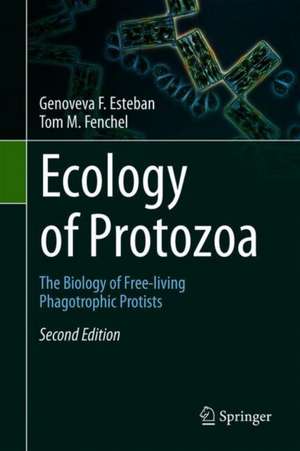Ecology of Protozoa: The Biology of Free-living Phagotrophic Protists
Autor Genoveva F. Esteban, Tom M. Fenchelen Limba Engleză Hardback – 5 ian 2021
Even though this group of unicellular organisms is highly diverse, the authors focus on shared ecological patterns. Students and scientists working in the areas of eukaryotic microbiology and ecology will appreciate this updated and revised 2nd Edition as a valuable reference guide to the “lifestyles” of protozoa.
| Toate formatele și edițiile | Preț | Express |
|---|---|---|
| Paperback (1) | 926.11 lei 3-5 săpt. | |
| Springer International Publishing – 6 ian 2022 | 926.11 lei 3-5 săpt. | |
| Hardback (1) | 733.59 lei 38-44 zile | |
| Springer International Publishing – 5 ian 2021 | 733.59 lei 38-44 zile |
Preț: 733.59 lei
Preț vechi: 965.25 lei
-24% Nou
Puncte Express: 1100
Preț estimativ în valută:
140.44€ • 144.43$ • 116.51£
140.44€ • 144.43$ • 116.51£
Carte tipărită la comandă
Livrare economică 15-21 februarie
Preluare comenzi: 021 569.72.76
Specificații
ISBN-13: 9783030599782
ISBN-10: 3030599787
Pagini: 186
Ilustrații: X, 186 p. 73 illus., 24 illus. in color.
Dimensiuni: 155 x 235 mm
Greutate: 0.41 kg
Ediția:2nd ed. 2020
Editura: Springer International Publishing
Colecția Springer
Locul publicării:Cham, Switzerland
ISBN-10: 3030599787
Pagini: 186
Ilustrații: X, 186 p. 73 illus., 24 illus. in color.
Dimensiuni: 155 x 235 mm
Greutate: 0.41 kg
Ediția:2nd ed. 2020
Editura: Springer International Publishing
Colecția Springer
Locul publicării:Cham, Switzerland
Cuprins
What is a Protozoon.- Motility: Life in Syrup.- Orientation in the Environment.- Feeding.- Bioenergetics.- Polymorphic Life Histories and Sex.- The Niches of Protozoa.- Symbiosis.- Marine Habitats.- Protozoan Communities in Freshwater Habitats.- Protozoan Communities: Terrestrial Habitats.- Symbiotic Protozoa.- Concluding Remarks.
Notă biografică
Genoveva Esteban is a Professor of Microbial Ecology at Bournemouth University (UK). She received her PhD from Universidad Complutense de Madrid (Spain) in 1989 and carried out two post-doctoral positions: one at the National Scientific Research Council in Spain (1990-1991), and the second (1992-1995) at the Institute of Freshwater Ecology (The Ferry House, Windermere, UK). She then became employed as a senior scientist at the Natural Environment Research Council (NERC, UK) until 2007. That same year, she moved to the university sector to work at Queen Mary University of London (2007-2011). She has published over 110 original articles and book chapters. Her research expertise is centered on free-living microbial eukaryotes.
Tom Fenchel is Emeritus Professor of Marine Biology at the University of Copenhagen (Denmark). He received his Ph.D. in 1965 and became employed at the Marine Biological Laboratory as lecturer. From 1970-1987 he became FullProfessor at the University of Aarhus and he returned to the University of Copenhagen in 1987 until formal retirement in 2010. He has published about 200 original papers on microbial ecology and population biology and has authored or co-authored five books.
Tom Fenchel is Emeritus Professor of Marine Biology at the University of Copenhagen (Denmark). He received his Ph.D. in 1965 and became employed at the Marine Biological Laboratory as lecturer. From 1970-1987 he became FullProfessor at the University of Aarhus and he returned to the University of Copenhagen in 1987 until formal retirement in 2010. He has published about 200 original papers on microbial ecology and population biology and has authored or co-authored five books.
Textul de pe ultima copertă
This book emphasises the important role that protozoa play in many natural ecosystems. To shed new light on their individual adaptive skills, the respective chapters examine the ecology and functional biology of this diverse group of eukaryotic microbes. Protozoa are well-established model organisms that exemplify many general problems in population ecology and community ecology, as well as evolutionary biology. Their particular characteristics, like large population sizes, life cycles and motile sensory behaviour, have a profound impact on their survival, distribution, and interaction with other species. Thus, readers will also be introduced to protozoan habitats in a broad range of environments.
Even though this group of unicellular organisms is highly diverse, the authors focus on shared ecological patterns. Students and scientists working in the areas of eukaryotic microbiology and ecology will appreciate this updated and revised 2nd Edition as a valuable reference guide to the “lifestyles” of protozoa.
Even though this group of unicellular organisms is highly diverse, the authors focus on shared ecological patterns. Students and scientists working in the areas of eukaryotic microbiology and ecology will appreciate this updated and revised 2nd Edition as a valuable reference guide to the “lifestyles” of protozoa.
Caracteristici
Highlights the importance of protozoa in natural ecosystems Fully revised and updated 2nd edition 1st edition cited over 1,000 times Written for ecologists and protozoologists alike
